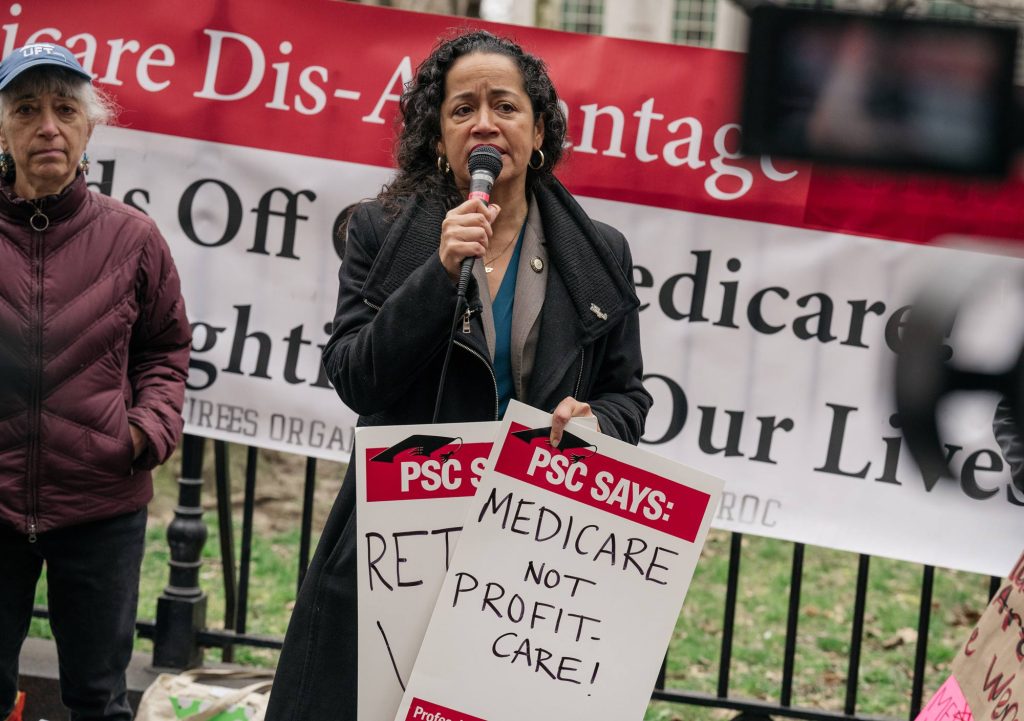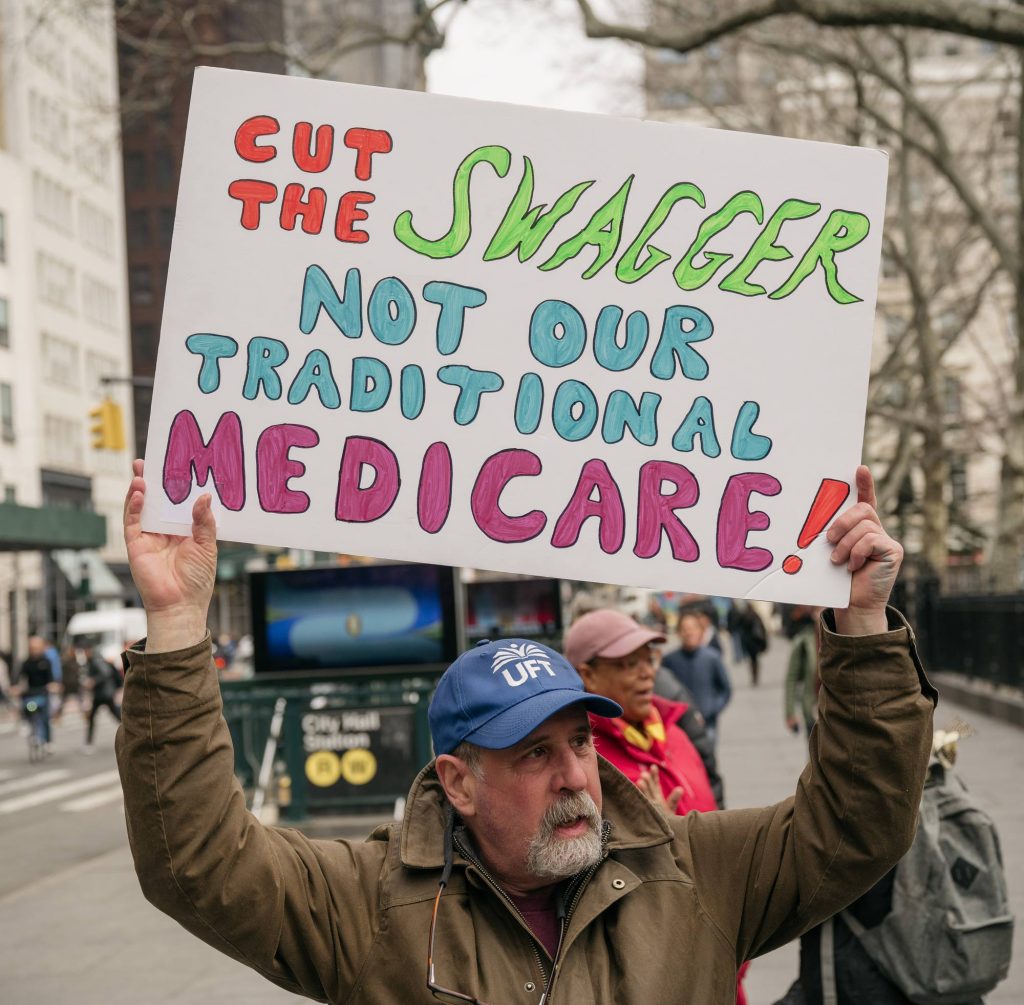A state appeals court has upheld a lower court’s decision blocking the implementation of a contract to replace municipal retiree health coverage with a privately administered system. It’s an enormous victory for retirees, organized labor and grassroots organizers who opposed the shift to Medicare Advantage, which many argued would have resulted in diminished care and higher costs.
The PSC was one of the few municipal unions that consistently opposed the shift to Medicare Advantage. The majority of affiliate unions of the Municipal Labor Committee, which negotiates health-care coverage for city workers, voted in favor of the Adams administration’s privatization plan (although the plot to move to a new plan finds its roots in the de Blasio administration). But now, the United Federation of Teachers has also turned against the mayor’s plan, a monumental development in the movement to protect union health care. The UFT leadership had been among the most vocal supporters and an influential voice in the MLC.

The PSC has long fought to protect retiree health benefits. (Credit: Scott Heins)
UFT OPPOSITION
“The United Federation of Teachers withdraws its support for the Medicare Advantage program for the New York City Medicare-eligible retirees as well as for the current health-care negotiations for in-service and pre-Medicare retirees,” UFT President Michael Mulgrew said in a June 23 statement. “It has become apparent that this administration is unwilling to continue this work in good faith.”
Retiree activists, some of whom are PSC members, held numerous rallies opposing the plan, in addition to lobbying the City Council and taking legal action against the proposed medical care shift. They were also joined by many active-duty PSC members. “Two important organizations, the NYC
Organization of Public Service Retirees [NYCOPSR] and the Cross-union Retirees Organizing Committee, emerged as leaders in the fight to save our Medicare. Many of the PSC retirees are members of those groups and have played a large role in this struggle,” said Nancy Romer, who serves as a retiree representative on the PSC executive council. “These groups have maintained that the retirees were promised publicly-run Medicare and Senior Care for over 50 years of employment and that changing that service now would be a breach of our contracts, showing bad faith on the part of the city.”
Former PSC President Barbara Bowen recalled, “From the start, the PSC recognized that the claim the City could pay less for retiree healthcare and deliver more was a fiction. I voted against both the 2014 and the 2018 health ‘savings’ agreements with the Municipal Labor Committee, but the PSC’s arguments did not prevail. The zero-sum logic that workers have to make concessions to get wage increases was too deeply embedded. By late 2020, when the City sought proposals to replace traditional Medicare with Medicare Advantage (which is not Medicare at all), the PSC Retirees Chapter started organizing opposition. Supported by the union leadership, PSC staff and Welfare Fund staff, the Retirees chapter worked courageously in those early stages of the process to inform members about the proposal and its dangers. In April 2021 the DA voted unanimously to support the retirees’ call for a citywide moratorium on the proposal. That call, unheeded at the time, turned out to be prescient.”
Romer credited the union’s Social Safety Net committee with raising the alarm about the proposal in the MLC to approve a privately administered plan. Former PSC president Barbara Bowen raised concerns about the MLC plan and expressed the union’s opposition, becoming a vocal advocate against privatization.
Romer added, “The PSC consistently offered organizing and expert medical insurance information and advice through Professor Barbara Caress and ex-PSC executive director Debbie Bell. The PSC also submitted an amicus brief in support of a recent NYCOPSR legal suit defending Medicare.”
PSC RESEARCH
PSC activists opposed the Medicare Advantage scheme because research has shown that such plans worsen health coverage for seniors and incentivize insurance companies to drain federal resources.
David Himmelstein and Stephanie Woolhandler are both distinguished professors at the School of Urban Public Health at Hunter College and founders of Physicians for a National Health Program, which advocates for single-payer insurance. “Medicare Advantage (MA) plans are immensely profitable for insurance companies like CVS/Aetna – providing as much as 90% of insurers’ total profits – but bad for patients and for taxpayers,” they said in a statement. “While enrollees in traditional Medicare can get care at any hospital and from the vast majority of doctors, MA plans limit enrollees to a narrow network of providers, often excluding specialized cancer centers and leading hospitals and physicians.”
They continued, “Reams of research has found that seniors in MA (relative to those in traditional Medicare) receive less medical care, e.g. fewer home care visits from aides, speech therapists, physical therapists, or nurses. Among cancer patients requiring complex surgeries, MA enrollees are less likely to get surgery at high-volume cancer hospitals where quality is highest, and suffer longer delays in treatment and higher death rates. And those needing a rehab stay (e.g. after a hip fracture) are often denied coverage.”
A Wall Street Journal investigation found that “private insurers involved in the government’s Medicare Advantage program made hundreds of thousands of questionable diagnoses that triggered extra taxpayer-funded payments from 2018 to 2021, including outright wrong ones,” and that “instead of saving taxpayers money, Medicare Advantage has added tens of billions of dollars in costs, researchers and some government officials have said.”

Retirees rallying against City Hall’s plan. (Credit: Scott Heins)
WELCOME NEWS
“It’s welcome news that Michael Mulgrew has withdrawn UFT support for the Office of Labor Relations/MLC plan to move municipal retirees from Medicare to Medicare Advantage, and has also backed off prospective MLC endorsement of a new and constricted health coverage plan, currently under negotiation, for those in service,” said James Perlstein, a PSC retiree activist. “These moves by the UFT testify to the power of the diverse grassroots movement that forced the union’s hand.”
Romer hopes that this will spur more unions to change their positions. “We hope that this wrong-headed proposal to save the city money will be buried, once and for all,” she said. “We need to tax the rich, not the elders; we need more money from the city and state to cover the full cost of our hardworking city workers and their benefits. I am proud that the PSC leadership and retiree membership stood up consistently and immediately to defend our rights.”
In June, the UFT Retired Teachers Chapter elected a slate of candidates that ran on a platform opposing the city’s shift to Medicare Advantage. President Mulgrew’s public statement attributed the change in the UFT’s position to the city’s unwillingness to work in good faith with the MLC. “This administration has proven to be more interested in cutting its costs than honestly working with us to provide high-quality health care to city workers,” he wrote.
JUST A START
Perlstein, like many who fought the privately administered plan, said this development is only the beginning of establishing a more just health-care coverage system. “We would hope that space has opened up for NYC to consider the kind of structural alternatives to health-care reform that do not place the burden of reform on the backs of those seeking care,” he said. “All the signs point to single-payer as the real answer.”
NYCOPSR President Marianne Pizzitola said that her organization is ready to go back to court if the Court of Appeals eventually hears the Adams administration’s appeal. She also said that her organization will reintroduce legislation to stop any privatization of retiree health coverage.
“We’re not giving up,” she said. “We’re right.”
Romer said that the big lesson from this fight is that different groups must come together with different tactics to take on a struggle as formidable as this one.
“It takes many, many different groups with many different approaches to move a mountain. This is what happened. They all moved together. The PSC played a role,” she said. “Ultimately, we need to be singing the same song, but we have to have multiple parts.”
Published: August 5, 2024

